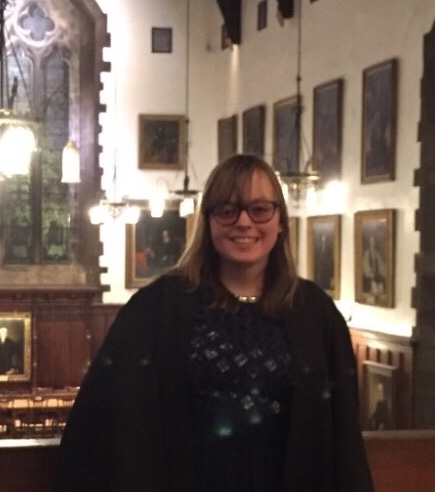Staff profile
Emma Yeo
Considering the existence/lack of a seventeenth century 'General Crisis', within the context of studies of individual communities within the North East of England.

| Affiliation |
|---|
| Considering the existence/lack of a seventeenth century 'General Crisis', within the context of studies of individual communities within the North East of England. in the Department of History |
Biography

Emma Yeo is an early modern historian focusing on the local history of North East England.
She is currently studying for a PhD at Durham and has previously graduated from Durham with an MA in Social and Economic History (Research Methods) and an MA in Classics and Ancient History from Newcastle, both with distinction.
Project Summary
The concept of a ‘General Crisis’ represents a widespread belief among historians that the seventeenth century witnessed a crisis in interpersonal conflict, as part of demographic, environmental and economic crises. Initially referring to Europe, the concept of a General Crisis in the seventeenth century has now been extended to societies across the globe.
Instead of focusing on global societal, economic or political tensions, I will examine the General Crisis in regional context and evaluate the evidence for a General Crisis in North-East England, particularly the Palatinate of Durham. I will test the ways in which this specific regional society experienced and resolved crises on the ground, balancing systemic issues such as climate change and demography with the agency of individuals. The resilience of communities within seventeenth-century Durham and the reasons for variations in levels of vulnerability to disaster will be considered.
Research Interests
Emma is also interested in the history of crisis more broadly, as reflected by her previous dissertation projects on the ill-fated fifth century Roman emperor Honorius (MA) and the local Easington Colliery Disaster (BA).
During the pandemic she joined a student-run autoethnography group designed to help us reflect upon our experiences of COVID-19 within an academic context. The first, and hopefully not last, journal article from this ongoing project has now been published.
Publications
Journal Article
- The Future of (Environmental) History: A Roundtable DiscussionHibberts, A., Yeo, E., Shelbourne, I., David Roberts, J., Kartashov, K., Pepper, N., Worsfold, A., Suits, R., Banbury, T., & Suresh, A. (2025). The Future of (Environmental) History: A Roundtable Discussion. Transactions of the Royal Historical Society. Advance online publication. https://doi.org/10.1017/S0080440125100285
- ‘Yeah, embrace your anger. Fuck them.’: using feminist collaborative autoethnography and an ethics of care to (re)imagine our position as disabled women in academic spaces during the COVID-19 pandemic and beyondRutter, N., Pilson, A., & Yeo, E. (2024). ‘Yeah, embrace your anger. Fuck them.’: using feminist collaborative autoethnography and an ethics of care to (re)imagine our position as disabled women in academic spaces during the COVID-19 pandemic and beyond. Feminist Review, 137(1), 53-70. https://doi.org/10.1177/01417789241249629
- We Need to be as a Group: Using and Evaluating the Listening Guide in Feminist Collaborative Autoethnography With an Affective ‘Fifth Listen’ as a Tool to (re)construct IdentitiesYeo, E., Pilson, A., Rutter, N., & Hasan, E. (2023). We Need to be as a Group: Using and Evaluating the Listening Guide in Feminist Collaborative Autoethnography With an Affective ‘Fifth Listen’ as a Tool to (re)construct Identities. International Journal of Qualitative Methods, 22, 1-11. https://doi.org/10.1177/16094069231180166
- “It’s the End of the PhD as We Know it, and We Feel Fine…Because Everything Is Fucked Anyway”: Utilizing Feminist Collaborative Autoethnography to Navigate Global CrisesRutter, N., Hasan, E., Pilson, A., & Yeo, E. (2023). “It’s the End of the PhD as We Know it, and We Feel Fine…Because Everything Is Fucked Anyway”: Utilizing Feminist Collaborative Autoethnography to Navigate Global Crises. International Journal of Qualitative Methods, 22. https://doi.org/10.1177/16094069211019595

